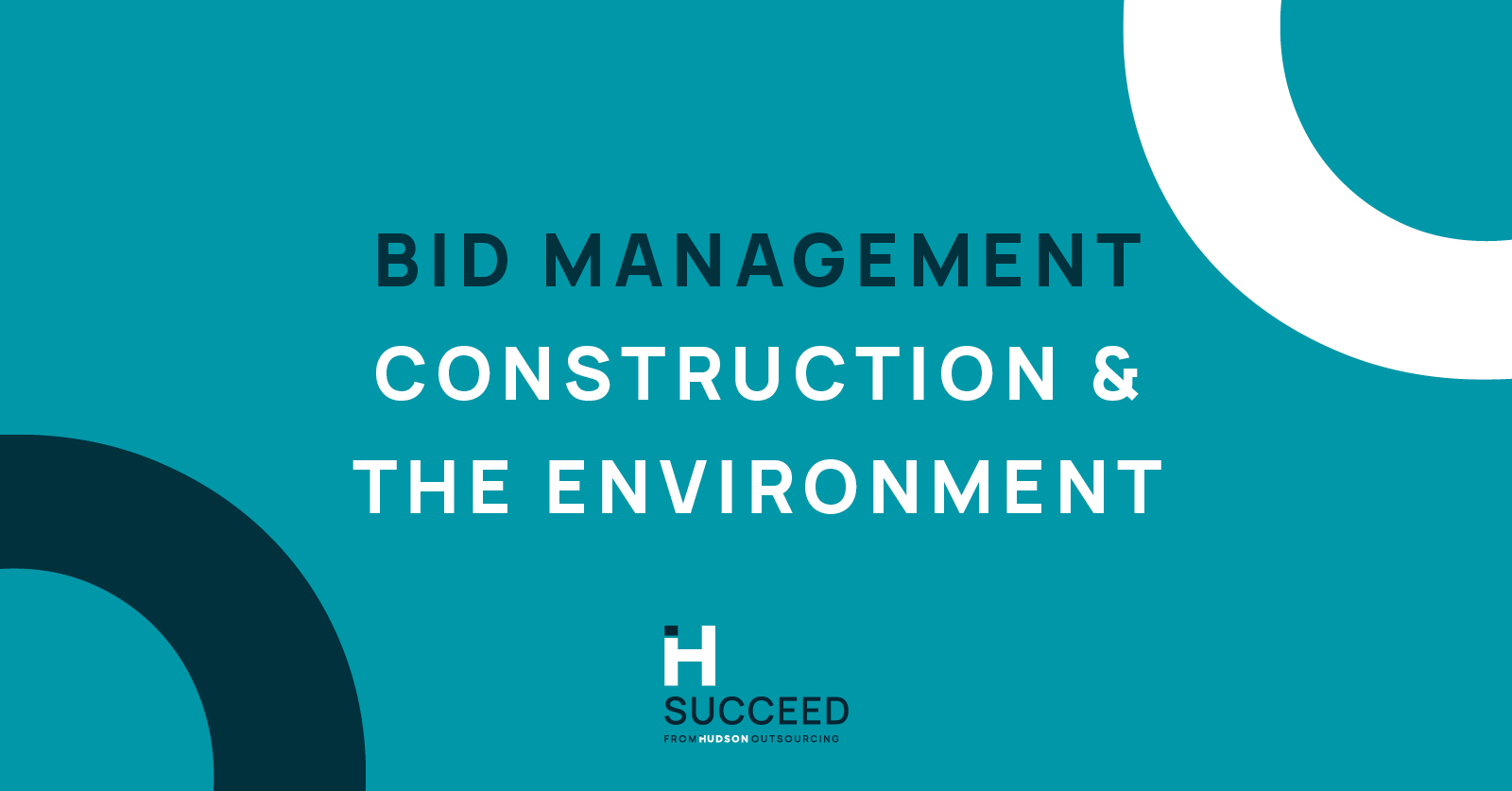Everything you need to know about construction bid management
Last updated: Dec 17, 2021 @ 9:30 am
The environment we live, work and socialise in is in flux. 2019 brought about the UN Climate Action Summit. The goal of this summit was to address climate change directly.
A key point was that globally, we must do more immediately to address climate change. The Paris Agreement plays a key role within sustainability and climate change.
It is an agreement initially reached at a Paris COP 21 climate change conference in 2015.
It was entered into force the following year.
The English text edition of the Paris Agreement (dated 2015) comprises of 29 Articles over 25 pages. This document sets out environmental aims and objectives, which are agreed by parties (parties here meaning countries).
Key points within the Paris Agreement which apply to the Construction industry include:
- Acknowledgement that we must take action against climate change based on scientific data. Climate change is an urgent threat;
- The importance of conserving greenhouse gas sinks. Sinks store carbon dioxide -examples include soil, sea and plants;
- Public awareness, education and training about climate is extremely important;
- Understanding that producing goods and services sustainably will help to address climate change.
To date, 189 parties of the United Nations Framework Convention on Climate Change (UNFCC) have signed. Across the world, countries are taking note that environmental action is needed, now.
Several UN climate action summits, conferences and dialogues were held in 2019. Locations included Madrid, New York, Brazil, Ghana and Poland. At these events, grassroots enterprises, big businesses and scientists gathered to discuss key environmental initiatives and plans.
Climate change
We can already see climate change in action right now. This is evident with increasing events such as:
- Australian bush fires in 2019 and 2020. These fires severely impacted people, animals and landscapes across the country. Global warming is likely to increase bushfire risk by 30%, according to the World Weather Attribution consortium and BBC.
- Recent NASA satellite data found that Greenland loses 283 gigatonnes of ice sheet mass every year. One gigatonne alone is comparable to the mass of one billion metric tonnes of ice sheet loss.
Climate and sustainability experts are concerned that we are not on target to meet average global temperate targets. Due to climate change, temperature have risen, which contributes to the events described above.
Climate change and construction bid management
Companies and individuals recognise the impact and responsibility they have when producing and delivering services. However, in 2018, new UK construction work was valued at over £113 million by the Office for National Statistics. There has also been a steady rise in new construction organisations carrying out works. This figure may prove contradictory to the needs of the Paris Agreement. How can construction businesses thrive economically, whilst also being sustainable?
Let’s look at some key construction companies within the industry. How are they reducing their environmental impact through service delivery?
- Amey: A huge competitor within the construction industry, they produced a white paper last year. This paper outlines decarbonisation within the UK. This involves significant changes to the heating structure, change in policy, and investment in low carbon technology.
- Kier Group Plc: Through smart technology, in line with high environmental standards, 92% of Kier Group operations are ISO 14001 certified. They provide energy saving advice to clients and are members of environmental protection schemes like the Considerate Constructors Scheme.
- Morgan Sindall: Recording their carbon emissions yearly enables Morgan Sindall to measure and reduce climate change impact. Morgan Sindall verifies their CO2 emissions through the Certified Emissions Measurement and Reduction Scheme (CEMARS). They also measure the total amount of construction activity waste which is diverted from landfill annually.
What might a bid manager and their construction clients consider?
Bid managers when supporting their construction sector clients will find very specific environmental questions in the tendering process. Social, legislative and environmental pressures influence questions posed by buyers seeking construction services. Buyers – particularly those within the public sector such as councils and government bodies – must consider sustainability. They must source construction companies who, through their service delivery, will:
- Mitigate climate change risks through practices and procedures;
- Provide sustainable and economic value both at contract acquisition and during contract lifetime.
How can construction organisations evidence sustainability?
There are numerous ways for a bid manager to support their construction sector client tenders. We can demonstrate innovations through for example:
- competitor analysis
- audits
- research
- policy and procedures.
As mentioned above, construction companies are responding to current environmental needs. It is essential going forward for others to follow suit. For service delivery to be economically sustainable, companies must demonstrate environmental sustainability to achieve this.
Innovation is key for larger companies, as they are at the forefront of public awareness. Larger companies who have the capital can invest in new methods of reducing and mitigating their CO2 emissions.
During tender writing, for any innovations, it is essential that they can be evidenced and measurable. This must be in solid facts and figures. There is little value in providing vague or airy statements without the ability to demonstrate this to buyers. Evidencing innovations will present your construction business as having transparency and integrity.
Small construction companies have just as much opportunity to demonstrate environmental innovation. If you have a small business, the best way to do so is to become involved with your community. Bid Managers may find that their construction client does not have formalised environmental evidence. This is something that they can develop with time and planning.
The supply chain – Construction Bid Management
For example, key in many construction contracts is the supply chain. Construction clients can commit to implementing sustainability within their supply chain. This can include:
- their transportation arrangements;
- raw materials;
- waste removal.
For example, can vehicles transporting materials commit to going electric? Can the business commit to hiring qualified staff who are local to the area. There are many options to explore here.
Other suggestions may include alternative means of communications for meetings, such as Skype or Zoom. This is particularly relevant given the recent social proximity restrictions due to COVID-19. Doing so enables individuals to maximise their productivity, spending less on the road commuting to meetings.
Dashboards
An environmental dashboard is an excellent opportunity for small and large construction companies to demonstrate innovation. This dashboard can be as flexible as your organisation needs it to be. Therefore, Bid Managers in the Construction Industry could suggest elements such as measuring energy, fuel or water consumption. Other approaches could be reporting on the total weight of construction materials recyclables saved from landfill each month.
Embodied Carbon
Embodied carbon is becoming something of a buzzword in construction tender questions. Indeed, demonstrating that your business measures embodied carbon is essential for many large construction businesses.
As a Bid Manager in Construction, it is important to differentiate between carbon footprint and embodied carbon, across your quality responses.
In simple terms, embodied carbon is measured through all processes starting from the ground (literally). It includes measurement project CO2 from the ground (raw materials) and includes:
On the other hand, carbon footprint is measured through the CO2 emissions produced by actually using the created product or service. When buyers pose the question of measurements, they are looking for:
- all carbon emissions used to produce a final construction project – this is embodied carbon.
- all carbon emissions produced by that completed construction project in use – this is carbon footprint.
Passivhaus
As a Bid Manager, your construction-sector clients may be interested in Passivhaus. Passivhaus is a building construction standard, established by The Passivhaus Trust. Buildings are designed and modelled using a bespoke package. The building is assessed, to determine if it passes criteria, such as:
- How airtight is the fabric of the building?
- Are the windows high performance and sufficiently insulating?
- Has the design enabled the efficient recovery of heat within the building?
- Is it very well insulated?
Buildings which can be certified as Passivhaus can range in size and scope. They are designed to be so efficient that the need for internal heating is negligible. This means that the building does not lose heat. So much so, that rooms maintain pleasant ambient air temperature within the space.
Passivhaus is important to the construction sector because it more heat-efficient buildings means less CO2. For one building alone – this makes a difference. For larger housing contracts and frameworks – the cumulative CO2 saving is more significant. Designing houses to this standard makes sense, both financially and environmentally.
It is beneficial for construction companies to consider Passivhaus, particularly those who specialise in housing. Passivhaus certification is highly regarded by procurement buyers seeking environmentally friendly construction businesses. The key here is that Passivhaus is more economical to implement during a building design phase. It can be potentially more costly to refurbish a space later on, in line with this standard.
Construction Bid Management – Looking forwards
It is clear that there are many environmental considerations for construction companies during the tendering process. Why not let our bid writing team help you to optimise each opportunity? Our highly experienced team know exactly how to win a tender. Our service will help you secure new, relevant construction contracts. We will work with you, to win those opportunities which your company can deliver, and identify areas where you can improve in order to grow your business. We support over 700 businesses globally – get in touch today to see how we can help with your construction bid management.
Find more helpful tips and advice in our blogs. We cover topics including:










